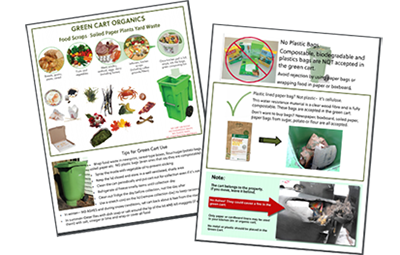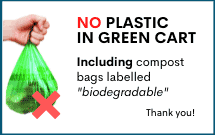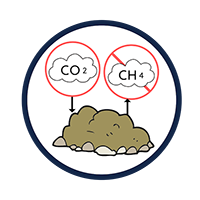Curbside Composting in West Hants
As of June 1st, 1997, compostable organic material was banned from entering Nova Scotia landfills. Initially, residents of West Hants were responsible for composting their food waste in backyard composters, but beginning in April 2018, the curbside composting program was introduced. Residents can now place compostable material in a green cart to be collected at the roadside every second week, where it will be collected and transported to Northridge Farms, a commercial producer and retailer of compost and compost tea.
Residents are able (and encouraged!) to continue using their backyard composters if they desire, while the green cart can still be used for the organic material that is unsuitable for backyard composters, such as bones, dairy or meat.
Download the full pdf Green Cart Information Guide(1.33 MB) .
 Are you a new resident without a Green Cart, or in need of a Green Cart repair?
Are you a new resident without a Green Cart, or in need of a Green Cart repair?
Submit an Online Service Request here!
Accepted
All Food Scraps
- including bones, shells and spoiled or raw food
- ensure all packaging and stickers are removed
Cooking Oil and Fat
Non-recyclable Paper Products
- e.g. paper towels, napkins, tissues, wax paper, wrapping paper, sugar bags, flour bags, salt bags, coffee filters, etc.
- soiled recyclable paper products (e.g. greasy pizza boxes, newspaper used to line your mini-bin, etc.)
Note: For clean and dry recyclable paper, recycling should always be your first option, as it provides valuable material for new products and reduces pressure on virgin forestry resources. Thank-you!
Coffee grounds, filters, tea bags
Yard Waste
- e.g. plants, leaves, weeds, brush, small branches
- place loosely in green cart
- ensure cart lid can close
Natural Bamboo and Wood Products
- e.g. wooden utensils, popsicle sticks, sawdust, wood chips, etc.
- remove any non-compostable materials (e.g. bristles on bamboo toothbrushes)
- small quantities only
Natural fibres
- e.g. scraps of natural twine (jute, sisal, hemp), 100% organic cotton, wool, etc.
- this does NOT include any synthetic fabrics or fabric soiled with hazardous waste (e.g. gas, oil)
Note: Unless soiled with hazardous waste, textiles can be taken to a drop-off site to be donated and recycled. Find your nearest donation site or store here.
Hair, fur, feathers
 Not Accepted
Not Accepted
- Plastic or Biodegradable Plastic of ANY kind
- INCLUDING plastic compost bags labelled as "biodegradable" and all other bioplastic products.
- View alternatives for lining your compost bin!
- Glass or metal
- Ashes
- Disposable coffee cups
- Milk cartons
- Pet or animal waste, including cat litter
- Diapers, wipes
- Soil, sods, rocks, logs, tree trunks, and large braches
Why do we compost?
 Reducing Greenhouse Gas Emissions - in More Ways than One!
Reducing Greenhouse Gas Emissions - in More Ways than One!
- When organic material rots in an anaerobic environment (without air circulation) like it does in a landfill, mass amounts of methane (CH4) is released. Methane is a very powerful greenhouse gas, which has about 84 times more heat-trapping power than Carbon Dioxide (CO2) in the first 2 decades of its release!
- Soil naturally sequesters (removes and stores) carbon from the atmosphere. By using compost material to amend soil, the storage of carbon will increase by optimizing the soil structure, and also by increasing biomass by supporting healthy plant root systems.
 Prolonging the Life of Our Landfill
Prolonging the Life of Our Landfill
Landfills are expensive to construct and require a considerable area of land. Once the landfill is sealed, the land is no longer usable and continuous monitoring must be performed to ensure no environmental issues arise. By collectively diverting our compostable material away from the landfill, we're contributing to a significant long-term benefit.
 Reducing the Need for Chemical Fertilizers
Reducing the Need for Chemical Fertilizers
Over time, the use of chemical fertilizers can change soil pH, upset beneficial microbial ecosystems, increase pests, and develop an inability to effectively retain moisture and carbon by damaging soil structure.
 Supporting the Local Economy
Supporting the Local Economy
- Turning "trash" into cash for local composting facilities and their employees
- To learn more, visit Northridge Fams

